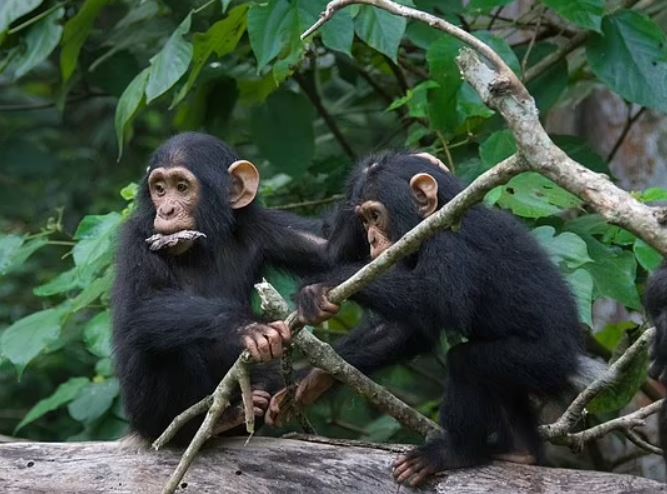On social media, a viral video showed a chimpanzee seemingly vocalizing the word “mama” to researchers, leaving viewers stunned.
Old footage surfaced, capturing the astonishing moment when chimpanzees appeared ‘capable’ of human speech, prompting researchers to study this oddity.

The resurfaced footage has reignited interest in the cognitive abilities of chimpanzees, revealing their capability for human-like speech.
Chimpanzees, who share nearly 99% of our DNA, are known for their intelligence and capacity to use sign language.
However, this new footage suggests they might also possess the ability to produce and understand human-like vocalizations.

This fascinating research quickly led to discoveries about the communication skills of our closest animal relatives.
Chimpanzees were captured ‘capable’ of human speech and resurfaced in viral video.
Historical footage from the 1960s and more recent clips from the 2000s have captured chimpanzees seemingly reproducing human speech.
Currently, the viral video has gained popularity after a Reddit user shared it on the platform, attracting attention from viewers.

In the footage, chimps were observed vocalizing the word “mama” when they were given cues from their handlers.
The researcher revealed chimpanzees’ capacity to understand human speech.
For vocalization to be considered true speech, two main criteria must be met: physical articulation and comprehension.
While parrots can imitate sounds, they lack understanding, so their mimicry does not qualify as genuine speech.
In contrast, great apes, such as chimpanzees, have the cognitive capacity to understand and use words meaningfully.

A research paper examining these videos noted, “Great ape vocal production capacities have been underestimated.
Chimpanzees possess the neural building blocks necessary for speech.”
One chimpanzee named Renata was recorded producing “mama” reliably, hinting at a possible foundational link to human speech.
The researcher revealed that chimpanzees learn and use human language.
Further research indicated that “mama” might be among the first words in human speech.
It suggested that chimpanzees could have the potential to learn and use language. However, other studies have shown less promising results.

For example, a chimpanzee named Viki, after a year of English training, could only produce a few words, including “mama,” “papa,” “up,” and “cup.”
Human speech is intricately linked to the physical structure of our bodies.
The muscles and tissues around our palate are crucial for producing diverse sounds in different languages.
For instance, sounds like “qaaf” in Arabic or “ã” in Portuguese involve parts of the palate that English does not utilize.
Given these physical constraints, it’s understandable why non-human species might struggle with speech production.
Despite this, chimpanzees are known for their advanced communication skills.
They are capable of exchanging complex information with one another.
Their ability to convey detailed messages shows their sophisticated methods of communication.








